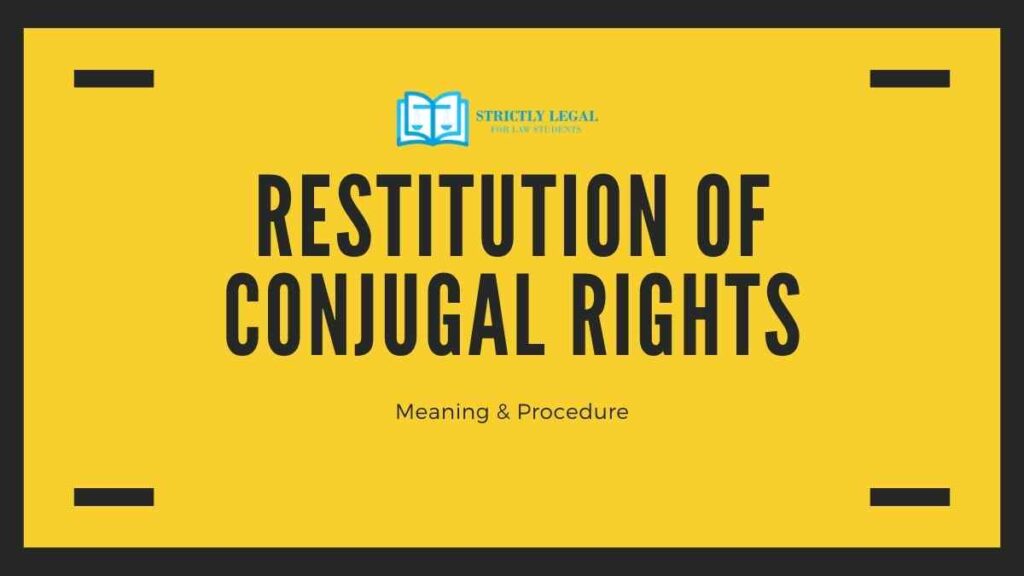India is a land of culture. Marriages in India are no less than a festival. They are considered one of the auspicious and sacred events/rituals of the country. A marriage is only considered logical and legitimate when the rituals, sacraments, and rites are performed.
We often come across news where the husband casts aside his wife by simply leaving her unanswered and uncared for or without a reasonable excuse and settling down with someone or something else or vice versa. In such a situation, the woman, who has been left in an abandoned married life, has all the rights legally to take a step and impel her husband to live with her. This right is not only for women, but men can also be advantaged for the same if their wife escapes from society without any reasonable excuse.
To settle down such disturbances in marriage, the “Hindu Marriage Act, 1951” came to the rescue for Marriages of the Hindus providing the married couple with certain rights and duties against each other in their marriage. Generally, in a marriage, it is conjectured that the husband and the wife have to live together post their marriage, but, both the parties have their fundamental right to get comfort from their respective partners/spouses. However, if either of them fails to carry through their obligations, the other partner has the right to remedy to impel him or her to do the same.
RESTITUTION OF CONJUGAL RIGHTS
In layman’s terms, restitution simply means restoring or regaining something that has been lost, while conjugal rights refer to the rights in sexual relations (marriage) which is regarded as a rehearsal by law by each partner in a marriage. In a nutshell it means restoring or resuming the marital relations between both spouses. The purpose is not to force the other partner, but to ease the marriage and help get on with each other’s society and life. The petition of restitution of conjugal rights is put in place so that the court could interfere between the parties to resolve the case and accord the “decree of restitution” to protect the union.
Section 9 of the Hindu Marriage Act, 1951 specifies the “restitution of conjugal rights” which is a relaxation and remedy availed by the aggrieved party that got cast aside by the other spouse without any reasonable excuse or any just explanation for the purpose of casting aside or abandonment. However, if the petitioner is guilty of conjugal misconduct or any such act or omission that makes it almost impossible for the respondent to further live with the petitioner for the rest of their lives, that would be considered a reasonable excuse for enforcement of such right.
In a reasonable excuse, the Hon’ble Court can refuse to accord an order of restitution of conjugal rights, for cruelty by husband or in-laws; husband’s failure to fulfill conjugal obligations, etc.
PROCEDURE TO FOLLOW FOR RESTITUTION OF CONJUGAL RIGHTS
- The abandoned spouse/partner will have to issue a legal notice through a competent advocate asking the other spouse to return or else he/she will be bound to initiate legal proceedings to enforce the rights for restitution. (For example : if marriage was under HMA then under section 9)
- The abandoned partner (petitioner) will file the restitution suit in the district court. Later the petitioner assigns the case to the Hon’ble High Court.
- Both the parties shall be present before the court on their given dates.
- Both the parties will be sent to a ‘counseling gathering’ by the court.
- Finally, the court shall pass a decree based on the description given by both parties.
LIMITATIONS OF RESTITUTION OF CONJUGAL RIGHTS
- If the other spouse repudiates to take up the decree or “restitution of conjugal rights”, the aggrieved party still has to wait for another year.
- A petition of divorce cannot be filed simultaneously with the petition of ‘restitution of conjugal rights”.
DOCUMENTS REQUIRED FOR RESTITUTION OF CONJUGAL RIGHTS
- Aggrieved party’s address and identity proof
- Marriage Proof of both the parties
- Photograph of the aggrieved party
- Documents showing the jurisdiction of the Hon’ble Court
CASE LAWS ON RESTITUTION OF CONJUGAL RIGHTS
- In the case of T. Sareetha v. T. Venkata Subbaiah [AIR 1983 AP 356], the Hon’ble High Court of Andhra Pradesh specified that the ancient Hindu Law always took women as a property and it was the duty of the Hindu wife to endure with her husband only as an ‘imperfect obligation’ who is not capable of being implemented against her will. The court left the free will and choice of the wife, completely. Hence, Section 9 of HMA was declared to be constitutionally invalid as it was condensing the rights of the wife guaranteed under part III of the Constitution, by depriving her of her choice and will.
- In Mirchumal v. Devi Bai [AIR 1977 Raj 113], the spouses served in two different places. The husband worked near Ajmer, and the wife worked in Adipur. The wife refused to quit the job, for which the husband filed the petition for restitution of conjugal rights. The Rajasthan High Court held that there was absolutely no refusal on the wife’s part to accord access to her husband and no unwillingness on her part to go to her husband, then the bare denial on her part to quit the job is a proficient ground for the husband to ask for relief for restitution of conjugal rights.
DIFFERENCE BETWEEN JUDICIAL SEPARATION AND RESTITUTION OF CONJUGAL RIGHTS
The decree of restitution cannot be acquired by enforcing someone who does not have the wish or will to live together with their partner, but the decree can be accomplished only by attachment of properties of the judgment debtor, but the “restitution of conjugal rights” does not last for more than one year. After a period of one year, it becomes one of the pretexts for divorce. However, judicial separation simply means, legal separation between couples without divorce.
RESTITUTION OF CONJUGAL RIGHTS IN MUSLIM LAW
The Honorable Supreme Court has endorsed the constitutional rationality of “restitution of conjugal rights” in the case of all religions including the Muhammadan Law.
In the case of Mohammad Amjad v. Mrs. Sarah, 2011, the respondent was a Hindu woman who showed her interest to marry the petitioner upon seeing an advertisement for marriage and voluntarily converted herself to Islam. The respondent once left the house premises one day when the petitioner wasn’t present at home. The Honourable Court held that a decree of “restitution of conjugal rights” may kindly be passed in favor of the petitioner against the respondent asking her to join her husband as a dutiful wife and further directed her not to abort the child.
In a similar way, a Christian Couple can also file for a “restitution of conjugal rights” under Sections 32 and 33 of the Indian Divorce Act, 1869.
FAQ on Restitution of conjugal rights
Any person whose spouse withdraws themselves or abandons from the society of the other without a reasonable excuse, may file “restitution of conjugal rights” or may approach the court for the same.
Conjugal rights are referred to as the rights created by marriage which simply means the right of a husband and a wife to stay or live together.
None of the laws, may it be personal, civil, or criminal, the courts can impel the husband and the wife to stay together, and neither can it enforce co-habitation between a couple through forceful means.
A petition for “restitution of conjugal rights” can only be claimed by the aggrieved party when the marriage is valid, without any gender bias.

Law student.
Turning legal insights into engaging narratives.





